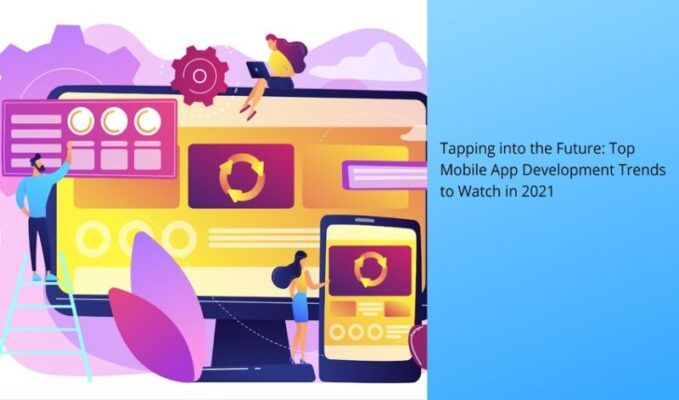Success in any business requires having a solid command of the latest trends and latest user expectations. In this respect, mobile app development is no different. When it comes to development trends, mobile apps have been beneficiaries of several new technologies such as virtual reality (VR), augmented reality (AR), artificial intelligence (AI), machine learning (ML), cloud computing, and several others.
New technologies, design-centric approaches and innovative user experience attributes over the years have given rise to a whole array of mobile app development trends. Here we are going to discuss the most dominating trends of 2021 that all mobile app development services should take into account.
Mobile IoT Apps
Internet of Things (IoT) represents the connected ecosystem of devices in which internet connection plays a key role in helping users access and operate these devices with ease and often from remotely and without physically handling these devices. These connected devices connected through IoT mobile apps allow maximum ease of use and operational flexibility.
These IoT apps will continue to dominate the app development space in the years to come. From adjusting tans controlling the home appliances from remote locations to maneuvering the home security systems to collaborating with the employees remotely through workplace systems to tracking machines and vehicles remotely through connected sensors, IoT apps and connected ecosystem will continue to drive innovation for mobile apps in the years to come.
5G Network
5G is already hyped to have the potential of delivering at least 100 times faster Internet speed than its predecessor 4G network. This lightning speed in sending and receiving information is going to revolutionize mobile app user experience and mobile app development. 5G is already here and it is going to be a reality for the masses in this year only.
Already leading apps have started to come with data architecture and tech stack that can do justice to the lightning-fast data speed of the 5G network. We can expect next-generation mobile apps will enjoy the ease of introducing audiovisual and real-time communication and collaboration features more easily than ever before thanks to the 5G network speed.
Artificial Intelligence (AI) and Machine Learning (ML)
Artificial intelligence (AI) is already there for smartphone users. AI is available through Virtual Assistants such as Siri, Google Assistants, and several others. AI has penetrated into mobile space through personalized and individual context-aware notifications sent by many apps. AI-powered chatbots allowing more humane conversation based on user intent and preferences are already a massive reality.
Machine Learning (ML), a subset of AI technology has also made its presence felt through recommendation engines, custom chatbot communication, and other means where learning user behaviour and catering to users accordingly is important. Both AI and ML are all set to play a bigger and better role in transforming the user experience of apps of the future.
Augmented Reality (AR)
There will be a continuous increase in the adoption of augmented reality (AR) technology in 2021 and years beyond. Already AR is popularly used in all sorts of apps for fusing the actual lived reality with digital reality. What once became phenomenally popular through an innovative game like Pokemon Go now emerged as a game-changer to transform online and offline retail, real estate marketing, educational apps, and many more.
This year, we can see more AR apps join this league and deliver more innovative augmented mobile experiences to the users. Online shoppers purchasing through mobile stores will be more habituated with trying new products digitally through apps. This is likely to revolutionize mobile shopping in more ways than one.
M-Commerce
M-commerce or mobile commerce apps are going to present a bigger trend this year. The pandemic led to crisis and lockdown measures in most parts of the world forced people to rely on mobile apps for shopping essentials like foods, groceries, and medicines. This means a lot of traditional shoppers now joined the mobile shopping bandwagon. This will give a big push to mobile commerce and on-demand apps.
On-demand apps catering to customers with doorstep services and delivery of all sorts of items will continue to get more popular. Particularly on-demand doctor apps, food apps, and on-demand apps for professional services such as teachers, beauticians, plumbers, and others will face more demands.
Apps for Foldable Phones
Foldable smartphones are already out and they are increasingly getting popular. Foldable smartphones released in the last couple of years such as Samsung Galaxy Fold, Huawei Mate X, Motorola Razr, and a few others could not really find specific apps catering to their fluid and foldable screen interface. This is where a new breed of apps are expected to arrive
This year we can see the emergence of several apps catering to these foldable smartphones. As in the last two years, the user base of these devices increased exponentially and almost created a new category between smartphones tablets, we can expect a new breed of apps to sweep the market targeting foldable device users.
Beacon and Geofencing Technologies
There is no dearth of demands for hyperlocal mobile apps and every search engine and the digital marketplace is focused on catering to users based on specific contexts and locations. Naturally, there will be continuous demand for hyperlocal app technologies such as geofencing and beacons.
Particularly retail stores will take advantage of these technologies to either attract customers passing nearby the store or to target customers whenever they come out of a specified location. These two technologies will also play a major role in connected vehicle apps, security apps, and administrative apps where monitoring the movement of people is important.
Conclusion
Probably, there are still several other mobile app development trends that we missed out on in this listing. Yes, the multi-cloud strategy will be popular among enterprise apps, Virtual Reality apps will be more popular in several niches, and Blockchain technology will be embraced by more apps for security reasons. These trends will shape the mobile apps of the present and future.
Read Dive is a leading technology blog focusing on different domains like Blockchain, AI, Chatbot, Fintech, Health Tech, Software Development and Testing. For guest blogging, please feel free to contact at readdive@gmail.com.





